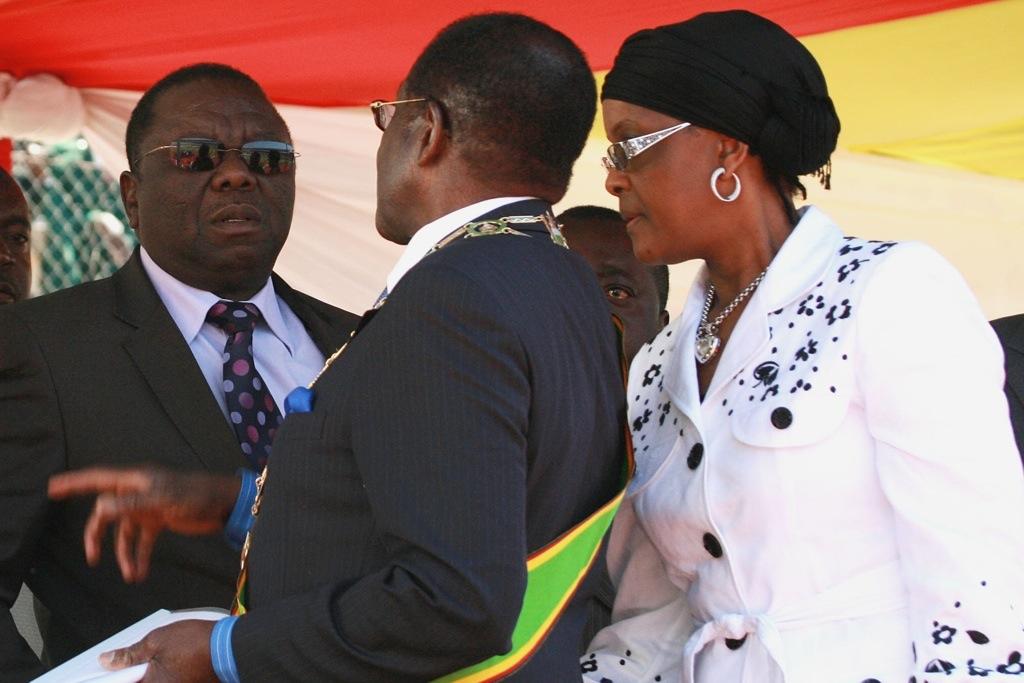Analysis: Mugabe and Tsvangirai square off for elections
Zimbabwean President Robert Mugabe, center, and his wife Grace, right, chat with Prime Minister Morgan Tsvangirai, left, at the National Sports Stadium in Harare.
HARARE, Zimbabwe — It is not difficult to tell when elections loom in Zimbabwe. The populace is treated to an outpouring of vitriol, which is designed to cow the opposition and bolster President Robert Mugabe’s prospects.
President Robert Mugabe, 87, hasn’t actually set the date for an election yet. But the climate is unmistakable. Just about anybody who can hold a pen is being required to sign a petition seeking the lifting of Western sanctions which, we are told, are responsible for the nation’s myriad woes. Some two million signatures are due to be handed in to the British and United States embassies, although rampant coercion is likely to be seen in Western eyes as invalidating the process.
The driver of deputy prime minister and Movement for Democratic Change (MDC) official Thokozani Khupe was arrested and detained for suggesting the exercise was “a waste of time.”
Headmasters in rural areas such as Chivhu have been told to use their schools as signing centers while shop owners have been told they would lose their licences if they didn’t sign.
But not everybody has been persuaded. One resident of a Harare township said there was a noticeable lack of enthusiasm where he lives.
“Most people here refused to comply,” he said, reflecting the views of the country’s youth.
Meanwhile, police have refused to allow the MDC to hold rallies on the outskirts of the capital. Those places were already booked by Mugabe’s Zanu-PF party, they were told. When asked about the following week the police said those places had already been booked as well. In fact all available space was block-booked for the rest of the year.
Harare’s mayor Muchadeyi Masunda said he had records to show there were no such bookings. But nevertheless the police prevented any MDC rallies from taking place.
They did not have sufficient resources to control crowds was there new excuse, although the riot police are quick to show their brutal presence if people do gather.
Meanwhile, the state broadcaster has been abusing its monopoly by carrying hagiographical accounts of Mugabe’s rule while excluding mention of other parties. It has also been screening grisly pictures of bodies retrieved from a mine at Mt. Darwin, 110 miles northeast of Harare, who Zanu-PF claims were victims of Rhodesian forces in the country’s 1970s bush war. But observers note that some of the 640 bodies brought up to the surface were still covered with skin and emitted fluids suggesting a more recent origin.
The MDC says 200 of its followers were killed in the political violence of 2008 but they have been careful not to claim the Mt. Darwin bodies as their former members in the absence of forensic tests.
Dumiso Dabengwa, intelligence chief of the old opposition Zapu party, has warned if Zanu-PF continues to make political capital out of the Mt. Darwin exhumations he will draw attention to the estimated 20,000 victims of Mugabe’s Fifth Brigade in Matabeleland in the early 1980s.
The pre-election campaign so far hasn’t been all plain sailing so far Mugabe.
Having carefully orchestrated the election of Zanu-PF’s chairman Simon Khaya Moyo to the speakership of the House of Assembly, Mugabe came down with a bump when his candidate lost to the MDC’s Lovemore Moyo, the previous speaker dethroned in a civil suit.
The president was stung by remarks from his regional colleagues denouncing violence. Southern African leaders in a summit communique from Livingstone in Zambia on March 31 expressed concern over the political polarization in Zimbabwe which they said was “characterized by violence, intimidation and arrests.”
“There must be an immediate end to violence, intimidation, hate speech, harassment and any other form of action that contradicts the letter and spirit of the (inter-party) global political agreement (GPA),” the regional leaders said in unprecedented public remarks.
Usually heads of state are reluctant to criticize each other over such issues.
Zimbabwe’s state press struck back with ferocity, referring to Zuma’s “duplicity.”
“His disconcerting behavior has now become a huge liability,” said Zimbabwe's state-owned Sunday Mail.
This follows shuttle diplomacy by Tsvangirai ahead of the summit in which he pointed out persistent human rights abuses and departures from the agreement that created the coalition government.
Communiques from SADC summits are usually dull reading. But the uncompromising language the Livingstone summit communique, clearly critical of Mugabe, represents a significant coup by Tsvangirai. Taken together with the MDC's victory over the House speakership provides the party with an important boost when its fortunes were flagging. It now remains to be seen what use Tsvangirai and the MDC can make of their advantage.
Every day, reporters and producers at The World are hard at work bringing you human-centered news from across the globe. But we can’t do it without you. We need your support to ensure we can continue this work for another year.
Make a gift today, and you’ll help us unlock a matching gift of $67,000!
